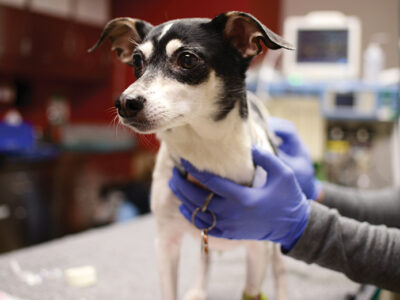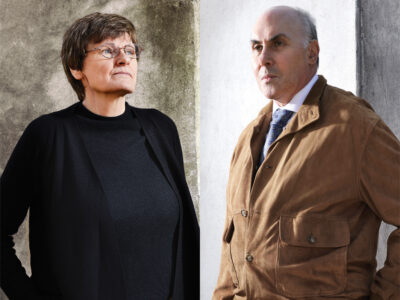“More than one billion poor people in Asia and Africa are closely linked with animals for their livelihoods,” Dr. Bernard Vallat said after receiving the inaugural Penn Vet World Award in April. “And they pay a really high tribute to different animal diseases … We can easily demonstrate that improving animal-health mechanisms at the national and local level, and decreasing this weight of animal diseases, will lead very quickly to the alleviation of poverty for this class of people.”
If it seems a little unusual to find a veterinarian setting his sights on global poverty, that’s just what Shirley and Vernon Hill W’67 aim to change by underwriting the School of Veterinary Medicine’s new prize, which provides $100,000 in unrestricted funding. That’s a significant sum in the world of veterinary medicine, and perhaps no one knows it better than Vallat, a Frenchman who has been director general of the World Organization of Animal Health (OIE) since 2000.
“He’s been working on animal health around the world for a very long time on several continents,” says Dr. Joan Hendricks, the Gilbert S. Kahn Dean of Veterinary Medicine. “He also personifies the best qualities of veterinarians. He’s very humble, absolutely science-driven, and very pragmatic.”
What’s more, she adds, OIE is a far cry from its human-health counterpart, the World Health Organization, which spends some $2 billion a year on its programs. “The organization is small and humble and very poorly funded for a global enterprise,” with an annual budget of around $20 million.
Its resources are modest, but OIE’s mandate is anything but. Under Vallat’s leadership, the organization brings together chief veterinary officers from 172 countries in an effort to create global standards of animal health and animal welfare robust enough to withstand the daunting challenges of worldwide commerce.
“Last year, over 21 billion food animals were produced worldwide to help feed a population of 6 billion people, resulting in trillions of pounds of animal products distributed worldwide,” Vallat observed. “Projections for 2020 show that demand for animal products will increase by 50 percent, especially in developing countries.”
This poses unprecedented risks for human safety, Vallat said. “Now pathogens are transported around the world faster than the average incubation time of most epizootic [diseases].” Considering that 60 percent of human pathogens are transmitted to us from animals, he added, “This means that the veterinary profession has to be ready.”
A self-described person “of rural origin” who discovered urban culture as a 15-year-old student in Toulouse, France, Vallat has spent most of his career working at the intersection of animal and human health. After 17 years practicing modern veterinary medicine in Chad and other rural areas in Africa, he began advising governments on issues of animal health and rural development. He subsequently served as the chief veterinary officer in France, a position that encompasses animal health, public health, and food quality.
Along with those core concerns, OIE also addresses farming practices, analyzes import risks, and mediates bilateral trade disputes among its member countries. Among its most important achievements in recent years, Vallat said in an interview, is the eradication of rhinderpest, a centuries-old intestinal disease also known as “cattle plague.” In the early 1980s, rhinderpest wiped out upwards of $500 million worth of African livestock, contributing to widespread human famine. Currently Vallat is focusing much of his energy fighting foot-and-mouth disease, a highly contagious virus that affects cattle, pigs, sheep, and goats in over 100 countries. “We need 30 to 40 years for that—if we get resources from rich countries.”
—T.P.
Student Awards
In addition to the Penn Vet World Award, the Vernon and Shirley Hill Foundation has underwritten a pair of $100,000 awards to be given each year through 2010 to two current Penn Vet students who embody “enterprise, creativity, vision, and talent.” This year’s winners are Rachel Toaff-Rosenstein V’09 and Warren Waybright V’09.
Toaff-Rosenstein has found her calling in animal welfare, breathing new life into the Penn Vet Animal Welfare Society while earning the top ranking in her class two years in a row. She plans to pursue a doctoral degree in farm-animal welfare science, with the ultimate aim of influencing policy and equipping other veterinarians with the tools to promote animals’ quality of life.
Waybright’s interest in developing-world veterinary care has taken him to Bolivia, where in 2007 he partnered with local agriculture students in an effort to root out brucellosis, an infectious disease that can be passed to humans from sheep, goats, cattle, dogs, and other animals. He hopes to create an international program through which veterinary students and professionals from rich countries can transfer expertise to their peers in poorer nations, while expanding their own cultural awareness in ways that can equip them to serve immigrant communities in the United States.
Dean Joan Hendricks says that no other prize for veterinary students comes close to what Vernon Hill wanted to offer. “He originally said, ‘What if I gave the students $100,000—would that be good?’ And [former dean] Alan [Kelly] and I both said, ‘Well, you would change their lives forever—and actually an award of that magnitude would change veterinary medicine, because there isn’t anything at that scale.’”
That was exactly Hill was aiming to do. “He had his eyes opened to the fact that safeguarding animal health has all of these repercussions on human health, public health, the environment, conservation, and the list goes on,” Hendricks explained. “He wanted to heighten awareness of that. So he came up with the idea of a really high-impact award.”
—T.P.




